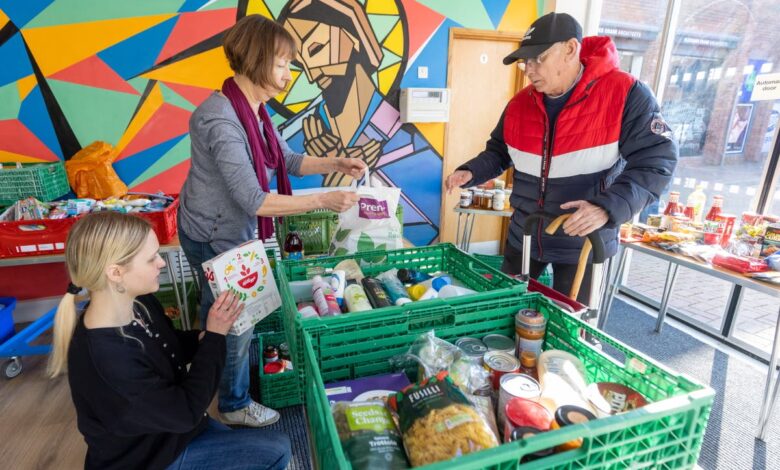‘Overwhelmed’ food banks forced to turn people away after running out of food

Food banks are running out of supplies amid an “overwhelming” surge of new people falling into hardship during the cost of living crisis, with some charities forced to turn away families in need.
Several managers told The Independent they had run out of food this summer, with some reducing the size of parcels and having “painful” conversations about whether to cap the number of people they can help.
The Independent Food Aid Network (Ifan), a network of 550 groups across Britain, said the safety net was “crumbling” because of the ongoing rise in the number seeking support, with empty shelves increasingly widespread.
The Trussell Trust – which runs a network of more than 1,300 food banks – said “many” of its outlets had been hit by shortages as demand rises. The organisation called on the government to “urgently” boost welfare payments so that more people can afford essentials.
A coalition of 70 charities urged Tory leadership contenders to more than double the level of emergency support to low-income families in order to avert a “catastrophe” this winter, while Labour joined the Liberal Democrats in calling for the energy price cap to be frozen.
“The huge demand in the past few months meant we ran out of food, we ran out of money, we had nothing,” says Tanisha Bramwell, manager at the Dewsbury food bank, which was forced to stop giving out parcels for several days in June. “It was really upsetting to turn people away, because we’re their last hope.”
Local charities have given the food bank money to buy supplies to help it survive in the short term, but Bramwell and the volunteers are still struggling to get in enough food and financial donations to keep up with the demand.
The charity is now seeing 120 to 150 individuals and families a week – more than double the 50 to 60 people a week it was helping at this time last year. “The deprivation has hit hard,” says Bramwell. “And there’s total dread about the energy bills in the autumn. People are in tears about it. They’re losing hope.”
Soaring inflation has seen millions of families struggle with rising food, gas and electricity bills, with further pain to come in the autumn once the energy price cap is hiked. Average household fuel bills are expected to climb to almost £3,600 in October, and to more than £4,200 in January – potentially topping £5,000 by next April.
“We’re totally overwhelmed with new people in trouble,” says Bramwell. “People in work who were donating food to us – some NHS nurses and care-home workers – are coming to us for help.”
Liverpool’s Micah food bank ran out of food on and off over a period of three weeks this summer. Volunteers had to give out small parcels of only a few canned goods before closing early on some days.
“It’s been the perfect storm – we had very little food coming in, and were seeing more people than ever,” executive director Paul O’Brien tells The Independent. “The shelves were bare. To run out of food is a bleak situation.”
Micah – open two days a week – has seen demand for help increase from around 220 households a week last year to around 400 a week now. O’Brien and his team have had “difficult conversations” about opening only one day a week.
“We’re having to think about whether to limit the number of opportunities for people to come and get food, or we won’t have enough to give proper parcels,” says O’Brien. “It’s not sustainable to expect us to be the safety net. We’re putting a plaster over a knife wound.”
Dr Naomi Maynard, a director at the Feeding Liverpool alliance of food charities, says: “We’re seeing it across the city – food banks cutting parcels or running out some days. It’s vital for the government to get money in people’s pockets before October, because food banks cannot cope with this rise in demand.”
William McGranaghan, manager at the Dad’s House food bank in west London, says he has run out of food several times in recent months, and has been forced to give out just a few tins to desperate families.
“To give out packs of breadcrumbs and a tin of chickpeas is heartbreaking,” he says. “We’re struggling – we just can’t keep up with the numbers. It’s a constant battle to keep enough food on the shelves.”
Demand for parcels at Dad’s House has shot up from around 400 to 700 households a month since the end of last year. But food donations have fallen by 50 per cent in the past few months, says McGranaghan – explaining that “middle class” donors are having to tighten their belts to avoid falling into hardship themselves.
Like other food bank managers, McGranaghan has to consider whether to cut parcels or limit the number of new people the charity can assist. “It’s painful to think about – it sends a shiver down my spine,” he says.





